1. Social Change and Documentary 1960s–80s
The filmmakers of the 1960s who sought a “New Latin American Cinema” were camera-carrying witnesses to a chaotic political situation. Some went missing, while others left their homelands as refugees, forced to complete their films abroad. Under immense difficulties, they attempted social revolution in a variety of forms, their impassioned broadcast of their compatriots’ true faces and voices evident in the representative works of “Third Cinema,” The Battle of Chile, the Caliwood movement in Colombia, and the recordings of the life-and-death struggles of students in Mexico.
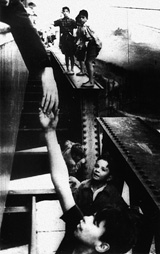 Tire Dié
Tire Dié
- ARGENTINA / 1960 / Spanish / B&W / 35mm / 33 min
Directors: Fernando Birri, Students at the Film Institute of the National University of the Litoral, Santa Fe
Editing: Antonio Ripoll
Sound: Mario Fezia, Leopoldo Orzali
Producer: Edgardo Pallero
Source: Fernando Martín Peña
Each day, children of a poor neighborhood in the city of Santa Fe, Argentina, putting their lives in danger on a railroad bridge, run and yell “tire dié” (toss ten centavos!) to the passengers as the train crosses the bridge with its heavy movement. A seminal work of social criticism in Argentinian documentary.
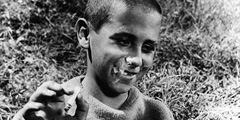 Chronicle of a Boy Alone
Chronicle of a Boy Alone
Crónica de un niño solo- ARGENTINA / 1965 / Spanish / B&W / 35mm / 79 min
Director: Leonardo Favio
Script: Leonardo Favio, Jorge Zuhair Jury
Photography: Ignacio Souto
Editing: Gerardo Rinaldi, Antonio Ripoll
Producers: Luis de Stefano, Isidro Miguel
Source: INCAA
The childhood and marginalization of a boy becomes a revealing testimony of life in Argentina in the 1960s. The boy’s innocence is transformed when he is put in a reform school, where he is punished. He manages to escape and return to his neighborhood. Prisoner of his solitude, the boy finds company in a childhood friend and new emotions. Losing one’s innocence means letting go of one’s dreams to face a reality that crushes everything.
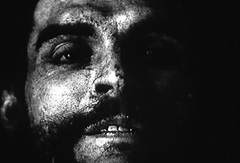 The Hour of Furnaces
The Hour of Furnaces
La Hora de los Hornos- ARGENTINA / 1968 / Spanish / B&W / 35mm / 260 min
Director, Script: Octavio Getino, Fernando Solanas
Photography: Juan Carlos Desanzo, Fernando Solanas
Editing: Juan Carlos Macías, Antonio Ripoll, Norma Torrado
Sound: Octavio Getino, Abelardo Kuschnir, Aníbal Libenson
Producers: Edgardo Pallero, Fernando Solanas
Source: INCAA
A revolutionary, political, and contentious film. It examines the economic, social, and cultural dependence of Argentina and offers guidelines on how to overcome it. The directors of this film, Octavio Getino and Fernando Solanas, were leaders of the Argentine film movement “Grupo Cine Liberación” from the late 1960s, writing their manifesto “Toward a Third Cinema” in 1969.
Part 1 Neocolonialism and Violence
The history and present of Argentina, the violence embedded in everyday life, and the path to resisting this violence are introduced in thirteen chapters. This film is dedicated to Che Guevara and all of those who fell during the struggle to liberate Latin America.
Part 2 Act for Liberation
The first half of the film, “Chronicle of Peronism” (1945–55) is divided into ten parts. The second half, “Chronicle of Resistance” (1955–66), is a depiction of a period of popular struggle by the Argentine people known as “The Ten Years of Violence.”
Part 3 Violence and Liberation
Constructed of interviews with labor union leaders, this film is dedicated to “The New Man” born of the struggle for liberation.
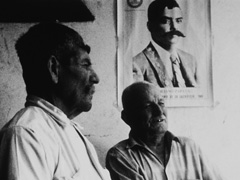 Mexico: The Frozen Revolution
Mexico: The Frozen Revolution
México, la revolución congelada- ARGENTINA / 1973 / Spanish / Color / Blu-ray (Original: 16mm) / 65 min
Director, Script: Raymundo Gleyzer
Photography: Humberto Ríos
Sound: Juana Sapire
Source: INCAA
Supported by archival materials from the 1910s, interviews with farmers, politicians, intellectuals, the middle class, and trade unionists, Argentine filmmaker Gleyzer traveled to Mexico to make this film. The political and social reality of Mexico is analyzed and made clear, against the historical background of the Mexican Revolution. It depicts the life of an indigenous family in Chiapas—their religious rituals, their crops, their opinions, and bilingual schools, in which classes are both in Spanish and the indigenous language. Finally comes the Tlatelolco massacre of 1968 in the plaza de las Tres Cuturas.
The Battle of Chile—The Struggle of an Unarmed People
La batalla de Chile—La luncha de un pueblo sin armas- CHILE, CUBA, FRANCE / 1975–78 / Spanish / B&W / Digital BETACAM (Original: 16mm) / 263 min
Director, Script: Patricio Guzmán
Assistant Director: Jose Bartolome
Photography: Jorge Müller Silva
Editing: Pedro Chaskel
Sound: Bernardo Menz
Source: ICARUS Films
Patricio Guzmán’s The Battle of Chile is a landmark work in Chilean documentary history. After documenting political unrest in Chile and the demise of the Allende administration, Guzmán went to France in exile following the coup d’état. The trilogy was completed with the support of Chris Marker and The Cuban Institute of Cinematographic Art and Industry (ICAIC).
Part I (1975) The Insurrection of the Bourgeoise
The parliamentary elections of March 1973 gave majority power to the Chilean left, sparking an extreme insurgence from the right. Allende’s socialism collapsed as the right’s violent campaign weakened the government, pulling the nation into crisis.
Part II (1976) The Coup D’état
On June 29, 1973, the military stormed the presidential palace. Allende resisted and the coup d’état was aborted, but it was only a matter of time before his administration would fall. Allende’s radio message broadcast to the Chilean people on September 11 was followed by his suicide. The coup was complete.
Part III (1978) Popular Power
Tens of thousands of working class people formed the organization “Popular Power,” resisting the black market through food production and other means. They managed it as a socialist organization, running factories and farms. This documentary shows the Chilean masses aspiring toward a Soviet-style socialism, as they opposed the anti-Allende administration and the right wing.
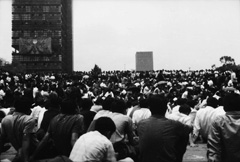 The Shout
The Shout
El grito- MEXICO / 1968 / Spanish / Color, B&W / 16mm / 101 min
Director: Leobardo López Aretche
Script: Oriana Fallaci
Photography: Leobardo López Aretche, Roberto Sánchez, José Rovirosa, Alfredo Joskowicz, Francisco Bojórquez, Jorge de la Rosa, León Chávez, Francisco Gaytán, Raúl Kamffer, Jaime Ponce, Federico Villegas, Arturo de la Rosa, Carlos Cuenca, Guillermo Díaz Palafox, Fernando Ladrón de Guevara, Juan Mora, Sergio Valdés, Federico Weingartshofer
Editing: Juan Ramón Aupart
Sound: Rodolfo Sánchez Alvarado
Music: Oscar Chávez
Production: CUEC UNAM
Source: Filmoteca de la UNAM
Featuring eyewitness footage of the student protest movement in Mexico City in 1968, this film is a work of experimental reportage. The director and seventeen of his classmates in the University Center for Film Studies at the National Autunomous University of Mexico edited together in collage-like fashion footage they took with 16mm cameras between July 1968 and the Tlatelolco Massacre on October 2, ten days prior to the opening of the Mexico Olympics.
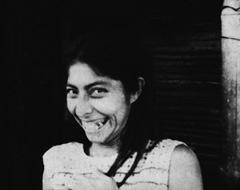 Listen, Look
Listen, Look
Oiga Vea- COLOMBIA / 1972 / Spanish / B&W / Blu-ray (Original: 16mm) / 27 min
Directors, Script: Luis Ospina, Carlos Mayolo
Photography: Carlos Mayolo
Editing, Sound: Luis Ospina
Music: Richie Ray, Bobby Cruz
Producers: Luis Ospina, Carlos Mayolo, Ciudad Solar
Source: Luis Ospina
This film was co-directed by Luis Ospina and Carlos Mayolo, members of Colombia’s “Caliwood” film movement of the 1970s and 80s. In 1971, Cali hosted the sixth Pan American Games, a sports tournament held in the Americas once every four years. The camera vividly captures those who are unable to participate in the event because of the high entry fee, standing outside the main arena which itself was built at exorbitant cost.
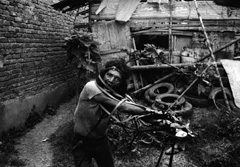 The Vampires of Poverty
The Vampires of Poverty
Agarrando pueblo- COLOMBIA / 1978 / Spanish / Color, B&W / Blu-ray (Original: 16mm) / 28 min
Directors, Script, Producers: Luis Ospina, Carlos Mayolo
Photography: Fernando Vélez, Eduardo Carvajal
Additional Photography: Jacques Marchal, Oswaldo López
Editing, Sound, Source: Luis Ospina
Assuming a Western point-of-view, this mockumentary satirizes so-called “poverty porn,” where Europeans and Americans visit Colombia and film members of the working class, beggars, and street children.
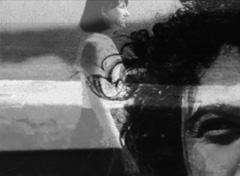 Stones in the Sky
Stones in the Sky
Rocha que voa- BRAZIL / 2002 / Portuguese, Spanish / Color / Blu-ray / 94 min
Director, Source: Eryk Rocha
Script, Editing: Eryk Rocha, Bruno Vasconcelos
Photography: Miguel Vasilskis
Sound: Bruno Vasconcelos
The film’s director, son of Brazilian director Glauber Rocha, traces the footsteps of his father by combining footage from Rocha’s two-year exile in Cuba in 1971–72 with interviews and recordings of people who knew him at the time. Featuring appearances from filmmakers like Santiago Álvarez and Humberto Solás, this film explores the intimate relationship between the two centerpieces of the New Latin American Cinema of the 1960s–70s: Brazil’s Cinema Novo and Cuba’s revolutionary cinema. Rocha in Spanish means “stone,” hence the English title.
